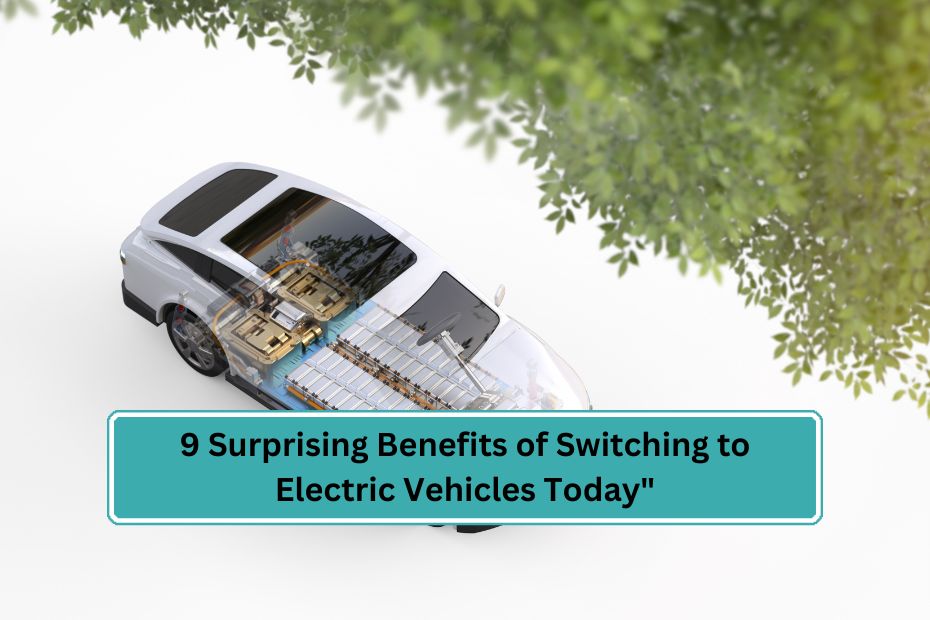Electric vehicles (EVs) have garnered significant attention in recent years as a sustainable alternative to traditional gasoline-powered cars. While many are familiar with the environmental benefits of EVs, such as reduced emissions, there are several other surprising advantages that make them an attractive choice for consumers. In this article, we’ll explore nine unexpected benefits of switching to electric vehicles today.
1. Environmental Impact
One of the most well-known benefits of electric vehicles is their positive impact on the environment. By running on electricity instead of gasoline, EVs produce zero tailpipe emissions, significantly reducing greenhouse gas emissions and air pollution. This not only helps combat climate change but also improves air quality in urban areas, leading to healthier communities and ecosystems.
2. Cost Savings
Switching to an electric vehicle can lead to significant cost savings for consumers. While EVs may have a higher upfront cost compared to traditional cars, they offer lower operating expenses in the long run. Electric vehicles require less maintenance than internal combustion engine vehicles, as they have fewer moving parts and don’t require oil changes. Additionally, the cost of electricity is typically lower than gasoline, resulting in savings on fuel expenses over time.
3. Advanced Technology
Electric vehicles are at the forefront of automotive technology, boasting advanced features and connectivity options. From cutting-edge battery technology to smart features such as remote vehicle monitoring and over-the-air updates, EVs offer a glimpse into the future of transportation. With innovations like regenerative braking and energy-efficient driving modes, electric vehicles are paving the way for more efficient and sustainable transportation solutions.
4. Performance
Contrary to popular belief, electric vehicles offer impressive performance characteristics that rival traditional gasoline-powered cars. Thanks to their electric motors, EVs deliver instant torque and smooth acceleration, providing a thrilling driving experience for enthusiasts. With lower centers of gravity and precise power delivery, electric vehicles offer superior handling and agility on the road, making them a favorite among drivers who value performance.
5. Convenience
Electric vehicles offer unmatched convenience when it comes to refueling. Unlike gasoline-powered cars that require frequent trips to the gas station, EV owners can conveniently charge their vehicles at home using a standard electrical outlet or dedicated charging station. With the proliferation of public charging infrastructure, range anxiety is becoming less of a concern, making electric vehicles a practical choice for everyday commuting and long-distance travel.
6. Health Benefits
In addition to reducing greenhouse gas emissions, electric vehicles also offer health benefits for individuals and communities. By eliminating tailpipe emissions, EVs help reduce air pollution and mitigate the harmful effects of vehicle exhaust on respiratory health. Furthermore, electric vehicles operate quietly, reducing noise pollution in urban areas and improving overall quality of life for residents.
7. Government Incentives
Governments around the world are offering incentives to encourage the adoption of electric vehicles. These incentives may include tax credits, rebates, and other financial incentives for purchasing EVs. Additionally, governments are investing in the development of charging infrastructure and implementing policies to promote electric vehicle adoption, further incentivizing consumers to make the switch to electric transportation.
8. Community Impact
Switching to electric vehicles can have a positive impact on the community and promote sustainable living. By choosing EVs, consumers are reducing their carbon footprint and contributing to efforts to combat climate change. Additionally, electric vehicles serve as a visible symbol of eco-conscious living, inspiring others to make environmentally friendly choices and adopt sustainable practices in their own lives.
9. Resilience to Fuel Price Volatility
Electric vehicles offer a degree of resilience to fluctuations in fuel prices, as they are not reliant on gasoline for propulsion. While gasoline prices can be subject to sudden spikes due to geopolitical tensions or market fluctuations, electricity prices tend to be more stable and predictable. This provides EV owners with peace of mind knowing that their transportation costs are less susceptible to external factors.
Conclusion
Electric vehicles offer a multitude of surprising benefits that make them an attractive choice for consumers looking to make the switch to sustainable transportation. From environmental impact and cost savings to advanced technology and convenience, EVs are changing the way we think about transportation. As governments, manufacturers, and consumers embrace the electric vehicle revolution, we have the opportunity to create a cleaner, greener future for generations to come.
FAQs:
1. Are electric vehicles really better for the environment? Yes, electric vehicles produce zero tailpipe emissions, reducing greenhouse gas emissions and air pollution compared to traditional gasoline-powered cars.
2. How much money can I save by switching to an electric vehicle? The cost savings associated with electric vehicles can vary depending on factors such as electricity rates, fuel prices, and driving habits. However, studies have shown that EVs typically have lower operating expenses compared to gasoline-powered cars over the lifetime of the vehicle.
3. Can I charge my electric vehicle at home? Yes, electric vehicle owners can charge their vehicles at home using a standard electrical outlet or a dedicated charging station installed in their garage or driveway.
4. Do governments offer incentives for purchasing electric vehicles? Yes, many governments offer incentives such as tax credits, rebates, and other financial incentives to encourage consumers to purchase electric vehicles.
5. Are electric vehicles as reliable as traditional gasoline-powered cars? Electric vehicles have fewer moving parts and require less maintenance than internal combustion engine vehicles, making them generally more reliable and cost-effective to own and operate in the long run.
